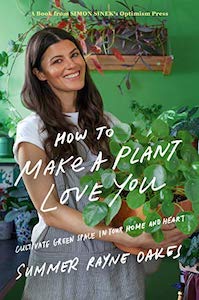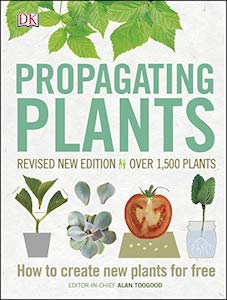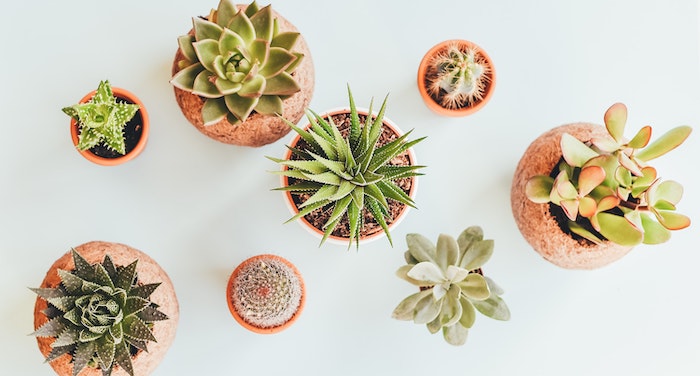Last year, Anna wrote a list of 14 House Plant Books for True Beginners. Since then, being a plant parent has become an official Thing, and the houseplant book world is only growing more lush. Here are five more books and a few extras to help expand your knowledge.
Variegation and propagating are IN. Plant swaps are The Business—or they will be once we are no longer required to keep our distance from one another, sigh. Whether you started your plant journey last year, last week, or are simply looking for another interesting thing to keep you occupied over what promises to be a very weird summer, here are some more books that will help keep your space green and happy.
 How to Make a Plant Love You: Cultivate Green Space in Your Home and Heart by Summer Rayne Oakes
How to Make a Plant Love You: Cultivate Green Space in Your Home and Heart by Summer Rayne Oakes
Summer Rayne Oakes (@homesteadbrooklyn on Instagram) is an environmental scientist who keeps hundreds of plants alive in her Brooklyn apartment. She promotes an approach to plant maintenance that includes thinking of plants as housemates as opposed to decor, and using your time caring for them as meditation. This book is admittedly a little crunchy, but in these times of climate change and rethinking how we care for the Earth and the people around us, I found it to be charming and helpful.
I still only name my problem plants, though. That way I can call them by their full names so they know when they’re in trouble.
 How to Grow and Create Fresh Air: 70+ Plants to Purify Your Home and Office by Akaya Etsuko
How to Grow and Create Fresh Air: 70+ Plants to Purify Your Home and Office by Akaya Etsuko
While there has been some controversy lately about whether plants do, in fact, freshen indoor air to a measurable degree, there’s no doubt at all about the mental health benefits of having living, green things around us. Etsuko lays out a clear care plan for each plant, as well as whether it’s harmful to humans or pets.
 Wild at Home: How to Style and Care for Beautiful Plants by Hilton Carter
Wild at Home: How to Style and Care for Beautiful Plants by Hilton Carter
Hilton Carter (@hiltoncarter on Instagram) is one of my favorite plant people on the internet. His Instagram is, as one would expect, gorgeous, and he has a lovely sense of humor about his plant obsession. He’s been making the plant podcast rounds as part of his book launch, and I thoroughly enjoy his perspective on growing relationships, whether they’re with plants or his wife. Additionally, he is very clear about his role as a Black man in the traditionally very white plant world, and speaks eloquently about encouraging other burgeoning young plant nerds of color to follow their interests.
 Propagating Plants: How to Create New Plants for Free by Alan Toogood
Propagating Plants: How to Create New Plants for Free by Alan Toogood
So now you have plants! You’ve figured out a care regimen, and they’re growing like gangbusters; congratulations! But now there’s a (good) problem: maybe they’ve gotten too big for the space, or they’ve started putting out little baby plants—I’m looking at you, spider plant and fiddle leaf fig—and you don’t need another spider plant or fiddle leaf fig because you already have one. Or maybe you’ve just decided everyone needs to become a Plant Person and the easiest way to do that is to give anyone who walks through your door a plant of their very own. Perhaps you are in the middle of creating your very own Propagation Wall now that you’ve read Hilton Carter’s books (ahem).
Enter Alan Toogood’s book on propagation. This is an excellent text, with explanations and techniques for lots of different types of plants. It’s used as a textbook in many horticultural classes, and thus I was pleasantly surprised to see it available at a non-textbook price point. Be careful, though; once you know how to propagate plants, you’ll quickly be tempted to ask friends, neighbors, and occasionally strangers if you can take a cutting of that cool thing they have in their house or yard. You may even start carrying a pair of pruning shears and a small bottle of sanitizer in your car, just in case you come across something fascinating.
Or maybe that’s just something I learned from my mom, whose thumb is so green it glows.
 My Big House Plant Journal—Notes on Your Favorite House Plants—Watering & Lighting Preferences, Fertilizing, Repotting, and lots more by Plant Lover Books
My Big House Plant Journal—Notes on Your Favorite House Plants—Watering & Lighting Preferences, Fertilizing, Repotting, and lots more by Plant Lover Books
Humans are extremely bad at gauging two things that are of critical importance to plants: light and wetness. We are also terrible at remembering the last time we completed an action, so I strongly recommend either getting a plant journal or setting one up in one of the blank notebooks we book folk seem to acquire regularly.
This one is perfect for keeping track of your plants—light preferences, whether they respond well to being moved around (many do NOT; ask me how I know), what kinds and percentages of fertilizer they prefer, and—most importantly—when you last watered them.
Honorable Mention and More Helpful Plant Parent Tools
The New Plant Parent: Develop Your Green Thumb and Care for Your House-Plant Family by Darryl Cheng
I find Cheng’s perspective on growing plants to be extremely my jam and find myself returning to his guidance regularly. It helps that we have similar taste in houseplants—everything he grows, I either have or have on my wishlist.
N.B.: Foot candles = lumens. Everyone except Cheng seems to have switched over, but I also find foot candles to be a delightfully obscure and strange phrase. YMMV.
A Light Meter App
Surprise! This is not a book, but smartphones all have light meters in them, and while they’re not the fancy kind that photographers use, they work perfectly well to measure the amount of light (in lumens) that a plant is getting. I use the free version of Korona.
A pH/Moisture Meter
Also not a book, but extremely helpful. On the advice of a more experienced plant friend, I stopped watering on a schedule and instead putter around with my meter and watering can every few days. Mine is analog and I found it at a hardware store for ~$10. I’ve gotten my money’s worth for sure; I cannot count the number of times I have thought “this plant is DRY!” when it is, in fact, perfectly fine. If you learn nothing else from reading about plants, learn this: overwatering is the plant killer.
I hope these tools will help you expand your journey to bring plants into your space and heart!
